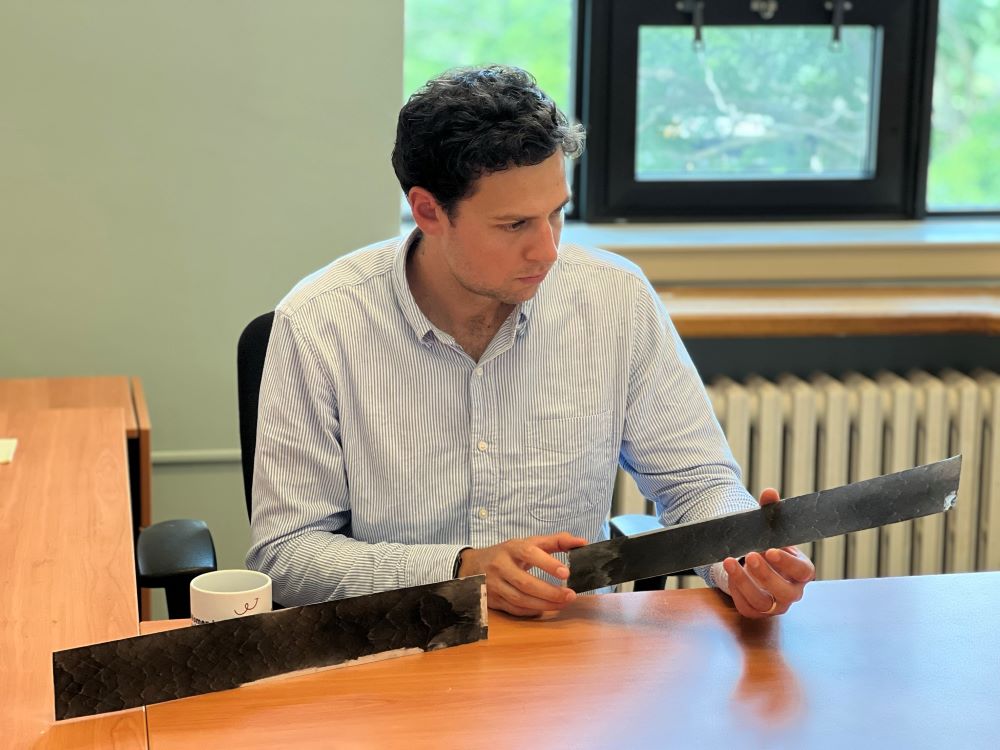Intensifying interest in decreasing carbon emissions to combat climate change is propelling research around the world to develop more efficient engines and alternative fuel sources. Jackson Crane is part of that effort, bringing a fresh perspective to energy innovation within the Mechanical and Materials Engineering department.
“As global greenhouse gas emissions continue to rise, there's a pressing need to develop new technological solutions, policy, and education around energy solutions,” Crane explains. “Certainly from an engineering perspective, it's an extremely important area to work on.”
Crane joined the Faculty of Engineering and Applied Science at Queen’s in January where he is focused on understanding, quantifying, and developing highly efficient energy systems that emphasize renewable fuel sources. He will teach an undergraduate thermodynamics course beginning this fall to help students explore, among other topics, how to convert fuels into electricity. He says he is excited to help the next generation of engineers thoughtfully examine energy systems while equipping them with the knowledge base to design and innovate new systems that drive down global greenhouse gas (GHG) emissions.
Alongside teaching, Crane plans to build his research team of five or six students over the next five years, including a mix of undergraduate and graduate students, as well as post-doctoral researchers.
Originally from the United States, Crane says Canada offers an excellent research ecosystem of funding availability and support.
“Queen’s is a great place for developing this type of research,” he says. “There’s currently limited activity in this research area, and so it’s a great opportunity to develop a stronger program, particularly due to the research’s strong alignment with the strategic vision of the institute.”
Cranes research is twofold, aiming to support the development of more efficient engines while also exploring fuel source alternatives.
“One of the main projects I work on is a technology called the rotating detonation engine, which is being intensely researched all around the world primarily because it has the promise of dramatically improving the efficiency of engines for multiple applications,” he explains.

Along with increased efficiency, these engines may be able to operate using non-conventional fuels, namely hydrogen or biofuels.
Crane says designing a new engine is exceedingly complex, requiring many specialized engineers and scientists working together.
“The thing I work specifically on is the combustion stability within that engine, and so better understanding the stability can improve the engine’s efficiency, safety, and operability. The innovations from the lab can then be translated to the larger engine development effort.”
While it is too early to know, Crane speculates the technology may be first deployed in niche applications such as deep space travel within the next few years before expanding to larger-scale applications such as commercial aviation.
Along with burning less fuel and thereby reducing GHGs, Crane says these new engines may eventually be cheaper to produce than conventional engines, making air travel less expensive to access.
“If we can improve the efficiency of engines, that's great, but it's not going to go all the way towards decarbonizing aviation, for example,” he says. “We need to seek other types of fuels that will do the rest of the job.”
To that end, Crane will be collaborating with a fellow researcher in the Queen’s Chemical Engineering department on ways to synthesize electrofuels, which are fuels made from carbon dioxide and renewable electricity, making them a net-zero fuel.
Crane’s work will build on his pre-existing collaboration with the University of Duisburg-Essen in Germany and will also grow partnerships with experts at the University of California, Irvine.
“We've already seen the effects of global climate change internationally with extreme weather, sea level rise, and crop patterns changes. There's a more existential threat with increased extreme weather, loss of biodiversity, island nations in danger, and more,” Crane explains. “We as a society urgently need to address this challenge and that needs to happen through government policy, individual action, and corporate action, but also through technology development, rollout, and innovation. We need all of them to really address this challenge.”
